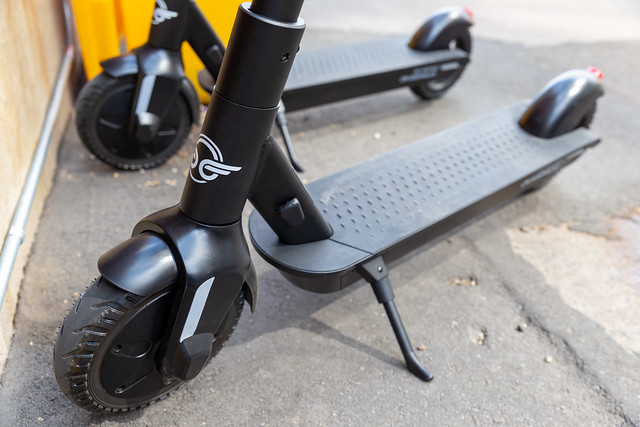
Photo: Mack-Male
UK cities could cut journey times with e-scooters
19 September 2019
by tom.w
Sixty-nine percent of last mile car journeys in Manchester could be completed faster by using e-scooters and bikes, a new report has revealed.
Researchers from traffic analytics firm Inrix analysed trillions of sources of data from connected devices such as cars, mobile phones and road sensors in order to determine patterns and trends.
With an average speed of 19 km/h, e-scooters and bikes were found to complete last-mile journeys quicker than motor vehicles in four UK cities–Manchester, Glasgow, London and Sheffield.
While Manchester has not addressed the introduction of e-scooters, Andy Burnham, Mayor of Greater Manchester has committed to increasing micro-mobility, promising to “double cycling, then double it again”, under the city’s ‘Beelines’ plan.
The £160-million scheme will create thousands of miles of interlinked, Dutch-style bike and walking lanes in the city, and aims to significantly relieve congestion.
Trevor Reed, a transportation analyst at Inrix and author of the report, told Cities Today: “Cities should really start looking at micro-mobility modes as a legitimate means to move people around their city, and not just as a novelty.
“At present though, legislation and public education does not do enough to encourage this.”
It is currently illegal to ride e-scooters on roads and pavements in the UK, though enforcement has only been stepped up recently following the death of a London e-scooter rider in July–the first known fatality in the UK.
In 2018 UK drivers lost an average of 178 hours stuck in traffic.
The report also found that UK cities have a much higher proportion of short-distance vehicle trips compared to those in the US, which is attributable to higher density levels stateside.
In another transport study, Chicago based mobility mapping provider HERE Mobility, found that on average one third of car owners don’t use their vehicles more than twice a day.
The analysis of 21,000 commuters across the US and Europe examined the transport patterns, perceptions, and expectations of people from nine countries–France, Spain, Germany, the US, UK, Netherlands, Norway, Finland, and Sweden.
Key findings included:
- Almost half of respondents use ride-hailing apps (47 percent in the US and 43 percent in Europe).
- Having children makes riders up to five times less likely to rely on public transit.
- 68 percent of respondents who primarily use their private car for transportation only use that vehicle “rarely” or “one to two times a day”.
“This study helped us better understand what drives consumer transportation choices, as well as finding what consumers view as missing in the existing transportation space,” added Irit Singer, Head of Marketing, Here Mobility.








